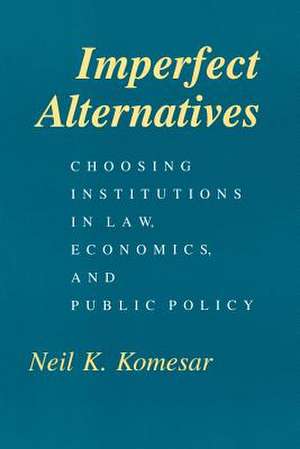Imperfect Alternatives: Choosing Institutions in Law, Economics, and Public Policy
Autor Neil K. Komesaren Limba Engleză Paperback – 5 feb 1997
Major approaches to law and public policy, ranging from law and economics to the fundamental rights approach to constitutional law, are based on the belief that the identification of the correct social goals or values is the key to describing or prescribing law and public policy outcomes. In this book, Neil Komesar argues that this emphasis on goal choice ignores an essential element—institutional choice. Indeed, as important as determining our social goals is deciding which institution is best equipped to implement them—the market, the political process, or the adjucative process.
Pointing out that all three institutions are massive, complex, and imperfect, Komesar develops a strategy for comparative institutional analysis that assesses variations in institutional ability. He then powerfully demonstrates the value of this analytical framework by using it to examine important contemporary issues ranging from tort reform to constitution-making.
Pointing out that all three institutions are massive, complex, and imperfect, Komesar develops a strategy for comparative institutional analysis that assesses variations in institutional ability. He then powerfully demonstrates the value of this analytical framework by using it to examine important contemporary issues ranging from tort reform to constitution-making.
Preț: 317.92 lei
Nou
Puncte Express: 477
Preț estimativ în valută:
60.84€ • 63.16$ • 50.73£
60.84€ • 63.16$ • 50.73£
Carte tipărită la comandă
Livrare economică 25 martie-08 aprilie
Preluare comenzi: 021 569.72.76
Specificații
ISBN-13: 9780226450896
ISBN-10: 0226450899
Pagini: 295
Dimensiuni: 152 x 229 x 20 mm
Greutate: 0.41 kg
Ediția:1
Editura: University of Chicago Press
Colecția University of Chicago Press
ISBN-10: 0226450899
Pagini: 295
Dimensiuni: 152 x 229 x 20 mm
Greutate: 0.41 kg
Ediția:1
Editura: University of Chicago Press
Colecția University of Chicago Press
Cuprins
Preface
Pt. I: Deciding Who Decides: The Comparative Analysis of Institutional Performance
1: Taking Institutional Choice Seriously
2: Social Goals and Public Policies: Bridging the Gap between Them
Pt. II: Who Plays, Who Doesn't: The Participation-Centered Approach to the Political Process, the Market, and the Courts
3: The Political Process: The Power of the Few and the Power of the Many
4: The Market Process: Transaction Costs and Transaction Benefits
5: The Courts as an Institution: The Structure and Scale of Justice
Pt. III: Applications: Weighing the Relative Merits of Institutions
6: Safety, Tort Law, and Tort Reform
7: Constitutional Law and Constitution Making
8: American Constitutional Law: The Contours of Judicial Review
9: Summary and Conclusion: Propositions Audiences, and Reformations
Author Index
Subject Index
Pt. I: Deciding Who Decides: The Comparative Analysis of Institutional Performance
1: Taking Institutional Choice Seriously
2: Social Goals and Public Policies: Bridging the Gap between Them
Pt. II: Who Plays, Who Doesn't: The Participation-Centered Approach to the Political Process, the Market, and the Courts
3: The Political Process: The Power of the Few and the Power of the Many
4: The Market Process: Transaction Costs and Transaction Benefits
5: The Courts as an Institution: The Structure and Scale of Justice
Pt. III: Applications: Weighing the Relative Merits of Institutions
6: Safety, Tort Law, and Tort Reform
7: Constitutional Law and Constitution Making
8: American Constitutional Law: The Contours of Judicial Review
9: Summary and Conclusion: Propositions Audiences, and Reformations
Author Index
Subject Index

















